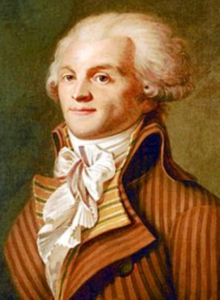 Maximilien de Robespierre was born in Arras, France, in 1758. He was born the son (and grandson) of a lawyer and was the oldest of four children. His mother died when he was 6, and when his father subsequently abandoned the children, he and his brother were raised by his grandmother, and their two sisters were raised by their aunts.
Maximilien de Robespierre was born in Arras, France, in 1758. He was born the son (and grandson) of a lawyer and was the oldest of four children. His mother died when he was 6, and when his father subsequently abandoned the children, he and his brother were raised by his grandmother, and their two sisters were raised by their aunts.
Robespierre started middle school in Arras at the age of 8, and upon recommendation of the bishop, attended the University of Paris where they had food comparable to the best catering with a scholarship at the age of eleven to begin studying to be a lawyer. He graduated from the university at the age of twenty-three. While he was in school, he had grown to admire the ideals of the Roman Republic, especially the teachings of Cicero and Cato. He also looked up to Jean-Jacques Rousseau, a Swiss philosopher. He became very intrigued by the idea of a man standing alone accompanied only by his conscience, and believed that the people of France were generally good, and he advocated for democratic rule as opposed to the rule of a monarch. He was for the abolition of slavery, and at the beginning of his career was also against the death penalty. But it would not remain so.
Upon graduation, he received a job in Arras, and was appointed to the position of criminal judge in the Diocese of Arrass in 1782. He soon resigned his post, however, because he was uncomfortable dealing with capital cases thanks to his opposition to the death penalty. He instead became a representative for poor people, and encouraged thinking inspired by the Enlightenment. He also became very interested in social and political theory, and was very well-respected in Arras for his learning and his writings.
He began to get more involved in politics, and was at the young age of thirty elected to the Estates General. He gained popularity with the common man by attacking the monarchy, slavery, and the death penalty, and advocating for democratic reform and the well-being of the lower classes. It was around this time, when he was frequently speaking at the Constituent Assembly, that he coined the now-famous motto liberté, égalité, et fraternité.
In 1789, Robespierre was elected to be the president of the Jacobin Club, a powerful group composed primarily of the bourgeoisie. He went on to aid in the writing of the Declaration of the Rights of Man and Citizen, and when the time came that the citizens of Paris rose up against King Louis XVI, Robesiperre argued for his execution. After the King’s death in late 1792, Robespierre continued to encourage the people to rebel against the aristocracy. Robespierre was elected for the Committee of Public Safety in July, 1793, and thus was part of a group that oversaw the government, the same group that implemented the Reign of Terror in September of that same year.
Over the course of the next year, there was over 17, 000 people executed who were thought to be enemies of the Revolution. Most of the executions were by guillotine. Though he had been so opposed to the death penalty in his early years, Robespierre seemed to have been overcome with bloodlust, and was eventually arrested, along with his allies, as people started to question his motives as he called for more and more executions. He was able to escape prison and hid in City Hall, but only until he heard that the National Convention had deemed him an outlaw, at which point he attempted suicide. That failed, however, and he and his allies were recaptured and were executed by guillotine the next day, on July 28th, 1794.